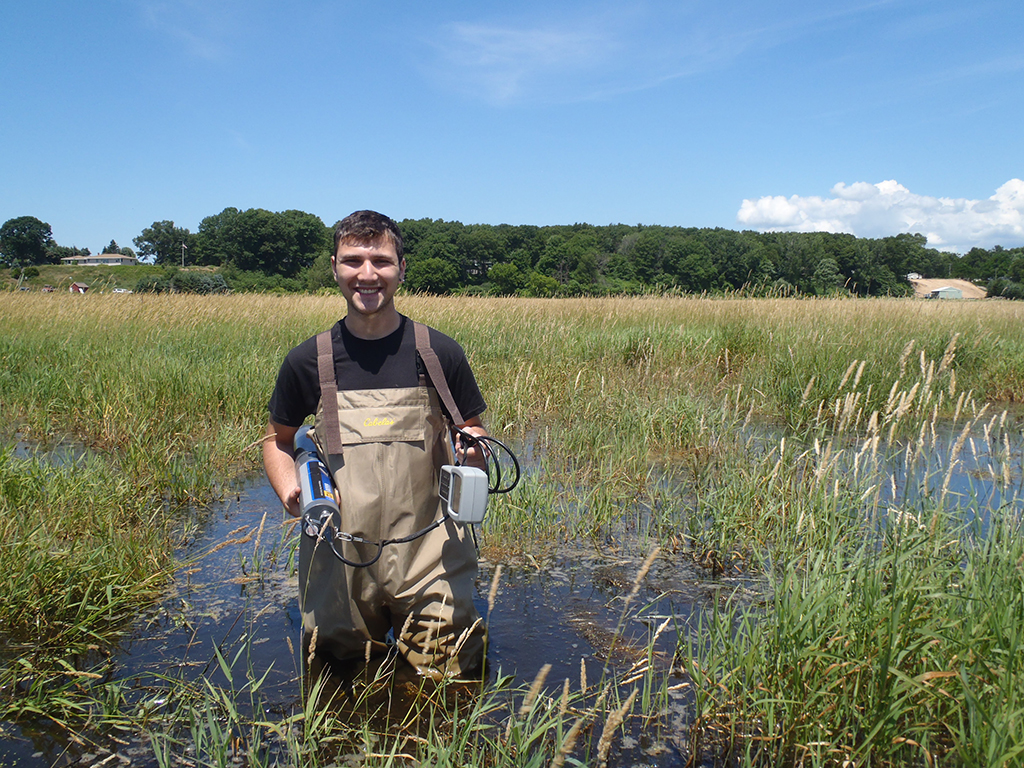A Master’s Degree in Environmental Policy
The Environmental Policy program is structured to give students significant flexibility in their coursework, the opportunity to receive additional certification in five subject areas, and the ability to complement classroom learning with more in-depth research (by completing a thesis) or practical experience (through on- and off-campus internships).
To earn an MA in Environmental Policy, students must complete 30 credit hours (or roughly 10 courses). Everyone must take the program’s three (3) core courses and at least one skills and methods course, and do either a master’s thesis or a semester-long internship. (Students can also choose to combine the EP program with a Community Fellowship. Those who do would count their fellowship toward this internship requirement.)
While some students take longer, it is possible to finish the program in as few as 12 months. Most students typically finish the program in 18 months (beginning in August and finishing in December of the following academic year).
Financial aid is available to help cover the cost of coursework, and EP also provides generous financial support for student research and professional travel.

Environmental Policy students participate in a community feedback session on plans for the nearby S. New Street Corridor with WRT, a planning design firm based in Philadelphia, and the City of Bethlehem.
Environmental Policy in the Community
EP at Lehigh is strongly committed to community outreach and environmental advocacy. While in the program, students put what they learn in the classroom to work for local, regional, national, and international partners. In collaboration with these partners, service-learning components of classes and student research, and students’ volunteer work and community fellowship and internship experiences, enable students to tackle various environment-related problems and play a significant part in improving the lives of people living in Lehigh’s South Side neighborhood and beyond. Internship opportunities at the United Nations, available through Lehigh’s United Nation’s Partnership and which a number of EP students take advantage of, expand this reach on an international scale. Whether focused down the street or across the globe, students gain hands-on experience in creating environmental policies that orient society toward a more environmentally healthy and sustainable future.

Urban Environmental Policy Workshop Student Project
Environmental Policy Required Courses
EP’s three core courses provide students with a political, legal, scientific, and sociological foundation in environmental issues and policy:
ES 401 Philosophical-Policy and Environmental Legal Design (3)
ES/EES 402 Scientific Foundations for Environmental Policy Design (3)
ES 404 Socio-cultural Foundations of Environmental Policy (3)
Approved skills and methods courses cover a range of approaches to studying the environment, determining the effectiveness of particular policies, analyzing quantitative and qualitative data, and mapping conditions and trends.
Environmental Policy Elective Courses
Students have a significant amount of flexibility when it comes to their 4 or 5 elective courses. While by no means students’ only choices, five areas of concentration are especially well-suited to faculty expertise and program resources, and students can receive a graduate certificate (in addition to their Master’s degree) in these subject areas. (For more information on EP Graduate Certificates, click here.) These include:
Environmental Health:
focuses on the ways both the built and natural environments affect individuals’ physical and mental health and well-being.
Environmental Justice:
grapples with how individuals of different classes and races access environmental amenities, environmental threats, and opportunity-rich environments in drastically different ways.
Environmental Law and Policy:
is an intensive study of policy design and analysis and has been a centerpiece of the EP program since its inception.
Sustainable Development:
considers the feasibility of and best practices for rationalizing urbanization, ensuring people’s economic well-being, addressing environmental quality and reliance on non-renewable resources, and encouraging social inclusion and equitable growth.
Urban Environmental Policy and Planning:
looks at the policies and programs designed to best integrate our cities and nature, and to create places where people can live, work, and visit in sustainable ways and that provide residents with both a good quality of life and access to opportunity.

